Interview: Big Fish & Begonia Directors Zhang Chun and Liang Xuan
by Michelle Liu,Liang Xuan and Zhang Chun are the directors of the hit animated film Big Fish and Begonia, which arrives in U.S. theaters on April 6th, 2018 in limited release (with a wider release coming April 11). Both were students at Tsinghua University when they met, Liang in the thermal engineering program and Zhang in the school of fine arts. In 2004, the two friends released the short film that would eventually become a fantasy epic, founding their studio B&T a year later. Over the next 12 years, they would work on Big Fish in stops and starts between other projects, including the 2006 short film "Swallowtail Butterfly" (Yàn Wěi Dié). Their vision became reality in 2016 when Big Fish and Begonia was finally released in China to critical approval and financial success, elevating these two artists to even greater heights and offering a promising vision of the future of Chinese animation.
With the film's American release imminent, we had the opportunity to sit down with the inspiring filmmakers behind this astonishing success.
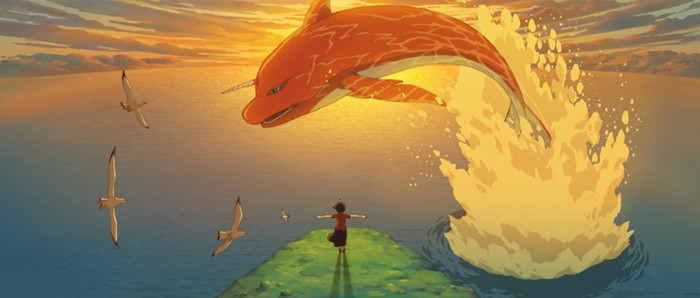
ANN: Big Fish and Begonia was in production for over a decade before Enlight Media invested in the project. In light of those struggles, what kept you going for all those years? Did you anticipate the film's success in the Chinese market?
Liang Xuan: B&T Studio was set up in 2003 with the intention to make movies, since we're all movie lovers. The idea of Big Fish & Begonia originated from one of my dreams. The film is like a child who was born in a dream, grew to a short film, and then to test footage, and finally became a movie. We always hoped that it could be completed one day to meet everyone.
The short film and test footage of Big Fish & Begonia got lots of attention. Although we thought the story had potential to succeed, instead of making it a typical commercial film, we followed our own personal sensibilities to tell the story in full.
We also hope to inspire young people to find things worth believing in with the work we've created. I think that effort has meaning, and has the potential to truly help our younger generation, our society, and even our country become more hopeful.
In 2013, the project gained some momentum after a crowdfunding campaign. What impact did this have on the project's direction?
Liang Xuan:The support and enthusiasm online was greater than what we ever imagined, and we raised 1.58 million RMB in just 44 days, which apparently broke a previous record.
Word of our crowd-funding success got the attention of Enlight Media. Enlight's President Wang Changtian and Vice President Li Xiaoping met with me and we talked for five or six hours, and we decided to work together three days after that.
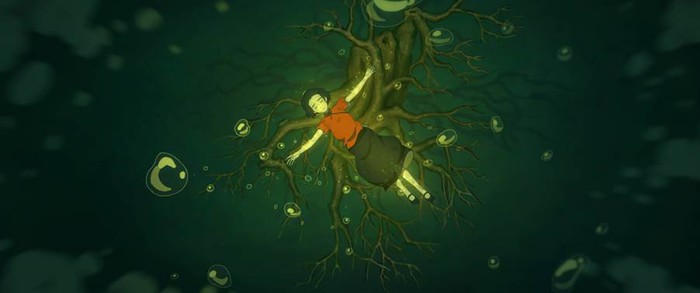
Big Fish was a pretty international production, enlisting Korean animation studio Studio Mir and Japanese composer Kiyoshi Yoshida. When in the production process did they get involved, and what was the experience of working with them like?
Zhang Chun:In the middle of production, we chose to collaborate with South Korea's Studio Mir. It wasn't a very smooth process, as language was a major obstacle. To get our ideas across more accurately, we changed translators 3 times. The animation style we were pursuing was a bit simpler and more unadorned compared to the more exaggerated Hollywood or Japanese styles they were familiar with, and the shots we had were complex and diverse. Thus producing the film was a great challenge for them.
Regarding the music, since Kiyoshi Yoshida's well-known composition Distant Journey was used as the theme in the early Flash animation short version of Big Fish, we invited him to be our composer for the film. We hoped that he'd create music for us that had the same dreamlike and ethereal quality that we found in his other work.
However, ten years had passed since Kiyoshi Yoshida composed Distant Journey. So whenever he had writer's block, he rode on a bicycle and wandered around by the sea. In order to capture the feeling that was present in his older music, Yoshida spent two years composing the music for Big Fish. His final score brought us to a world full of ancient Eastern artistic concepts and dreamlike mysteries.
Despite the international crew, Big Fish is heavily steeped in Chinese culture, drawing on mythology and literature such as Zhuangzi and Classic of Mountains and Seas. How important was it to remain faithful to those earlier stories?
Liang Xuan:The reason why these myths and literary classics have a history of thousands of years is because they contain some universal values for different societies or mankind as a whole. The protection of life, the yearning for freedom and so on. So even after thousands of years, they can still resonate with people today.
Of course, these stories are full of mysterious and magical elements, and we hope to produce new interpretations and presentations of these ancient words through the language of the film.
Most people in China grow up studying ancient Chinese poems, like classics from the Tang and Song dynasties. As a filmmaker, if I can include artistic concepts and great imaginative elements unique to China in a film, then Chinese films will have a chance to stand out from other movies. And those are the kinds of movies that can only be made in China.
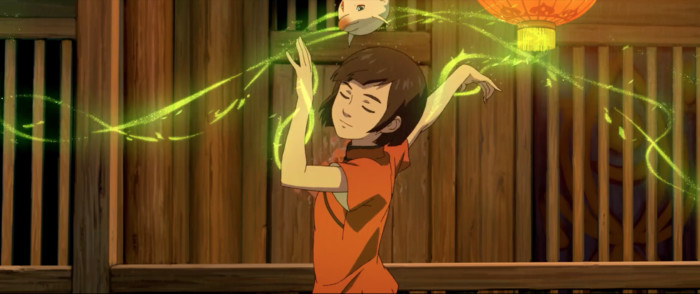
Was being accessible to foreign audiences ever a concern?
Liang Xuan:We didn't think too much when we started actually. The original idea for this came from my dream, and from a dream it became a short film, and then a feature film.
I only wanted to tell the story I envisioned in my mind in its entirety. There's a lot of Chinese traditional elements and mythology in the film, so the Chinese audience might be able to see things that they can relate to. It's also a very emotional film, so I believe people everywhere who enjoy films full of heart or that are interested in Chinese culture will really like this film.
The project began as a short film popularly received within online communities. How did the story grow from that original short? What were your inspirations?
Liang Xuan:Big Fish & Begonia was originally a short film we made in 2004, and was also originally for a competition. The first prize for winning the competition was 80,000 RMB, and we thought that if we won, we'd be able to completely focus on our productions.
Around that time, I had a dream. I dreamt about a small fish growing bigger and bigger. And it finally became an enormous fish that was so big that there was no place to hold it. When I woke up, I told Zhang Chun about this dream. He said he was immediately floored by what I told him, and that he associated the dream with freedom and a mystical sense of time.
We gathered some friends together online and took about a month to create a 7-minute flash animation. A young girl receives a whale and she raises it inside a cup, and all the while the whale continues to grow until only the sky is big enough to hold it.
So we managed to actually win first place in the competition, and our flash animation short had a sizable audience that supported it. We thought that we had to make it into a film one day. In March of 2005, we founded our company B&T.
Another inspiration for Big Fish & Begonia came from an ancient text called Wandering at Ease in the Zhuangzi. Our film had plenty of archetypes and references to the book's myths.
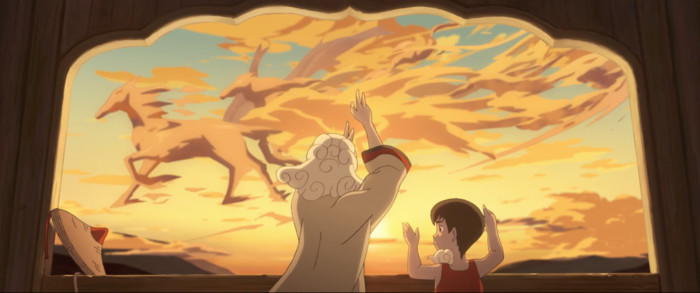
I found it interesting that the film has no single villain, unlike many animated films for/about children. What was the thinking behind this?
Liang Xuan:Right, we didn't set out to create a villain like you'd see in a mainstream movie. There's no absolute hero or villain in the story, just like in real life.
The main obstacle for the protagonist in the film comes from the rules of heaven, or from nature. Every one of us faces lots of choices in our life, and choice costs something. Since we can't predict the future, what really matters are the choices we make, and being brave enough to take responsibility for whatever happens.
What kind of message do you hope viewers take away from the film?
Liang Xuan:The story of Big Fish has several levels: The first level is the fairy tale, and the second level is about protection. Chun protects Kun, while Qiu protects Chun and the big fish creature. The third level is about the pursuit of freedom. The fish grows into a giant whale-like creature, and then finally returns to the human world by the end of the film. The story also hints at the relationship between man and God and the concept of home, etc. I hope that different audiences see different things when they watch the movie.
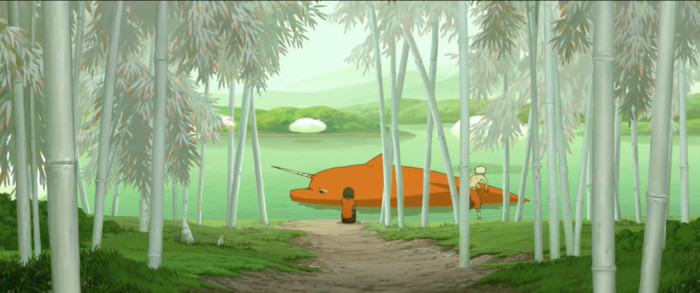
Some have said that this film marks a major breakthrough in Chinese animation. What do you see in the future for the Chinese animation industry?
Liang Xuan:The Chinese animation industry is at the beginning of a huge growth period. In the past, Chinese animation had a brilliant history. We have ink animation classics such as Where is Mama? (1960), and feature animations like Havoc in Heaven (1965). But Chinese animation has been developing slowly in the last few decades, and gradually it lost its ability to compete on a bigger stage. Compared with American animation and Japanese animation, there is a big gap between Chinese animation and the rest.
From 2007 to 2009, we worked on the test footage for a feature film version of Big Fish, and got a lot of awards and attention from that. There were a lot of talented artists working together during the production of the test footage, and many of them later became elite artists in the local animation industry. At that time, a domestic animation that strived for such high quality was a novelty for the audience, and everyone hoped that it could be made into a movie one day. But no one had faith in the Chinese animation market at that time. Big Fish received investment from Enlight Media in 2013, when the film project was restarted. Finally, our film had a chance to meet the audience in 2016.
The film has been successful in a business sense, and has also given Chinese audiences more confidence in domestic animation. But there are still a lot of shortcomings that we can improve on. Since Big Fish is our first movie, our creative skills are still far from perfect. We had this idea when we were 20, which was ten years ago. Our attitudes and knowledge are constantly changing and growing. We've experienced a lot lately, and there's a lot of emotions we've been processing.
Big Fish was our calling card to get into the film industry, and we hope to make better work in the future.
In recent years, some excellent Chinese animated films were released and did very well at the box office. That means the market is now looking forward to more domestic animated films. There's more and more capital and talent entering the animation fields in both film and television, and I believe that Chinese animation will soon enter a period of rapid development. And there'll be a great many excellent animation works produced in China in the future.
Do you have any ideas for future projects? What are your plans for B&T?
Liang Xuan:We're working on the sequel to Big Fish & Begonia, and are currently in the pre-production phase. In the future we'll work on other fantasy or sci-fi animated films.
Our thanks to Zhang Chun, Liang Xuan and Shout! Factory for the opportunity.
discuss this in the forum (7 posts) |
this article has been modified since it was originally posted; see change history